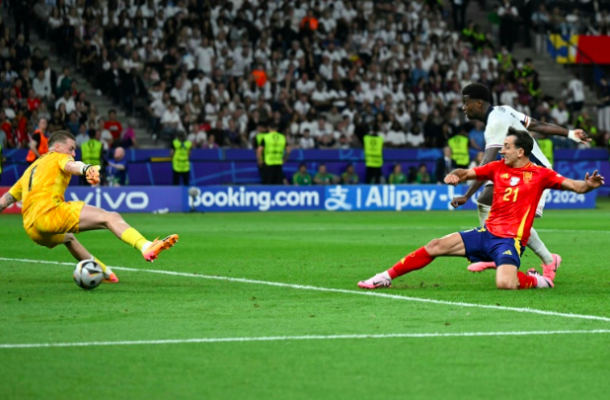It’s the golden hour for Dani Olmo…
The 26-year-old Spanish professional footballer, who plays for Bundesliga club RB Leipzig and the Spain national team, is among six players who’ve shared the Euro 2024 Golden Boot, having all scored three goals during the tournament.
 Olmo is sharing the European Championships top-scorer prize with Harry Kane (England), Cody Gakpo (Netherlands), Georges Mikautadze (Georgia), Jamal Musiala (Germany) and Ivan Schranz (Slovakia) make up the congested leaderboard.
Olmo is sharing the European Championships top-scorer prize with Harry Kane (England), Cody Gakpo (Netherlands), Georges Mikautadze (Georgia), Jamal Musiala (Germany) and Ivan Schranz (Slovakia) make up the congested leaderboard.
Olmo and Kane couldn’t pull clear of the pack with a goal in Sunday’s final which Spain won 2-1 against England.
UEFA confirmed on Friday that they would share the Euro 2024 Golden Boot between six players if Sunday’s final between England and Spain failed to produce a clear winner of the trophy.
It marked a change in policy for the tournament organizers who had previously awarded the prize to the player who had registered the most assists when more than one player were tied for goals scored.
At Euro 2020, Cristiano Ronaldo won the Golden Boot, though he had scored the same amount of goals as Czechia‘s Patrik Schick (5), the Portugal forward had also contributed one assist.
Three goals is the lowest tally for a Golden Boot winner since Euro 2012 when Fernando Torres (Spain), Mario Gomez (Germany) and Alan Dzagoev (Russia) all ended the tournament with three goals.
Torres was awarded the golden boot that year as he played fewer minutes than the other players who had scored three goals.
Olmo started just three of Spain’s seven matches at Euro 2024, before taking Barcelona midfielder Pedri‘s place in the team after he was injured in the quarterfinal victory over hosts Germany.
The RB Leipzig midfielder scored in all three of Spain’s matches in the knockout rounds before Sunday’s final.

